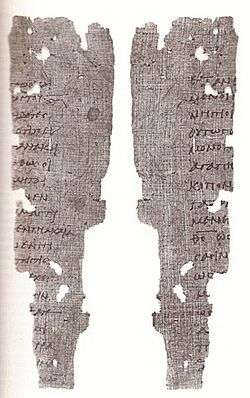1 Thessalonians 2
1 Thessalonians 2 is the second chapter of the First Epistle to the Thessalonians in the New Testament of the Christian bible.[lower-alpha 1] It is authored by Paul the Apostle, likely written in Corinth in about 50–51 CE for the church in Thessalonica.[1] This chapter contains the review of Paul's previous ministry in Thessalonica.[2]
| 1 Thessalonians 2 | |
|---|---|
 Fragments showing First Epistle to the Thessalonians 1:3–2:1 and 2:6–13 on Papyrus 65, from the third century. | |
| Book | First Epistle to the Thessalonians |
| Category | Pauline epistles |
| Christian Bible part | New Testament |
| Order in the Christian part | 13 |
Text
The original text was written in Koine Greek. This Bible chapter is divided into 20 verses.
Textual witnesses
Some early manuscripts containing the text of this chapter are:
- Papyrus 46 (c. AD 200; extant verses 1–3)
- Papyrus 65 (3rd century)
- Codex Vaticanus (325–350)
- Codex Sinaiticus (330–360)
- Codex Alexandrinus (400–440)
- Codex Ephraemi Rescriptus (c. 450; extant verses 1–8)
- Codex Freerianus (c. 450; extant verses 7–9, 14–16)
- Codex Claromontanus (c. 550)
The divine basis for Paul's initial visit (2:1–4)
Paul reminds the believers about the fruitful works he started in Thessalonica, despite the suffering (Greek: hubristhentes, "physically assaulted and dishonored") he and his co-workers (presumably Silvanus and Timothy) experienced in Philippi, that with the help of God (lit. 'in our God') the gospel was preached in the midst of opposition (Greek: agōn).[2] The persecution in Philippi may be the same as that noted in Acts 16:19-24, where Paul and Silas (same as 'Silvanus') were dragged "into the marketplace to the authorities", and "the magistrates tore off their clothes and commanded them to be beaten with rods", then after "they had laid many stripes on them, they threw them into prison", "put them into the inner prison and fastened their feet in the stocks".[2]
The behavior and example of the people (2:5–12)
Verse 10
- You are witnesses, and God also, how devoutly and justly and blamelessly we behaved ourselves among you who believe;[lower-alpha 2]
- "You are witnesses, and God also": the church is the witness for the more open part and God for the more secret part of all their actions.[lower-alpha 3]
- "How devoutly [NKJV; KJV: 'holily'], and justly, and blamelessly [NKJV; KJV: 'unblamably'] we behaved ourselves among you who believe": The Syriac version combines the verses to read, "ye are witnesses, and God also, how purely and justly we preached unto you the Gospel of God, and how unblamable we were among all that believed"; referring the former part to the purity and integrity in which they preached the Gospel, and the latter to their unblemished conduct among the believers; and it was likewise "just", that is, righteous in the sight of God through the justifying righteousness of Christ, and in consequence of this lived righteously before men; as well as "unblamable"; not without sin, but by the grace of God, there was nothing material to be alleged against them, or any just cause of blame to be laid either on their persons or their ministry.[lower-alpha 3]
The response of the Thessalonians (2:13–16)
Paul gratefully recalls the acceptance of God's words by the Thessalonians, but condemns some Jews, classified as 'the Judeans' (Greek: Ioudaioi; specifically for a group of Jews who was oriented to Judea, to Jerusalem and the temple within it), who persecute Christians and were connected by Paul to the killing of Jesus and the prophets.[3]
Paul's desire to visit the Thessalonians (2:17–20)
In this section Paul expresses his eagerness to be physically with the Thessalonians again, even as he was hindered to do so on a number of occasions.[4]
See also
Notes
- 1 Thessalonians 2 (NIV)
- 1 Thessalonians 2:10 (NKJV)
- 1 Thessalonians 2:10 Commentary — John Gill's Exposition of the Bible
References
- Esler 2007, p. 1199.
- Esler 2007, p. 1203.
- Esler 2007, p. 1204–1205; Jones 2019.
- Esler 2007, p. 1205.
Sources
- Esler, Philip F. (2007). "1 Thessalonians". In Barton, John; Muddiman, John (eds.). The Oxford Bible Commentary (pbk) (1st ed.). Oxford University Press. pp. 1199–1212. ISBN 978-0-19-927718-6. Retrieved June 5, 2019.
- Jones, E. Michael (May 14, 2019). Acceptance or Rejection of Christ (Video) (interview by Paul Stevenson of Revolution Radio at FreedomSlips.com; addresses the Poway synagogue shooting). United States: YouTube. Retrieved June 5, 2019.
External links
- 1 Thessalonians 2 King James Bible - Wikisource
- English Translation with Parallel Latin Vulgate
- Online Bible at GospelHall.org (ESV, KJV, Darby, American Standard Version, Bible in Basic English)
- Multiple bible versions at Bible Gateway (NKJV, NIV, NRSV etc.)